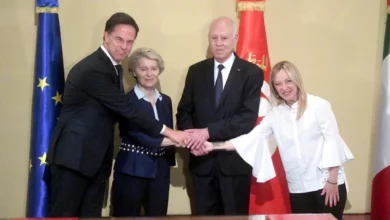In an America which was prematurely described as post-racial, divisive expression and bigotry are reaching a deafening crescendo. From Arizona's anti-immigrant law to the craze surrounding an Islamic center in New York's financial district and Quran-burning ceremonies to commemorate the September 11th attacks, the New World's oft-embattled principles of religious tolerance and civil liberties are at threat. The latest salvo last weekend was the convergence of thousands of right-wing zealots on Washington, DC in a show of political strength on a most improbable anniversary–47 years after Rev. Martin Luther King Jr.’s iconic “I have a dream” speech at the height of the civil rights movement. Under the title “Restoring Honor,” they hijacked King’s legacy to justify their war against America’s first bi-racial president.
On 11 September, 2001, Arabs, Middle Easterners and Muslims found themselves the target of the US security apparatus' suspicion and scrutiny. Profiling had become central to the intelligence community's information-gathering, law enforcement agencies' protective measures, and the media's representation of both.
Yet, the profiling of Arabs, Middle Easterners and Muslims did not begin on that forsaken day; instead it has roots in a long-held association between traits and behaviors, and propagated by systems of dissemination that predate contemporary mass communication. With the rise of anti- and post-colonial politics in the Arab World during the mid-1950s came an interrogation not only of the imperial enterprise in the region, but also a counteracting critique of the way in which the Orient was represented to justify its control, subjugation and exploitation.
In 1978, a substantive and encompassing analysis identified the institutionalization of prejudicial representations of the Orient both in scholarship on the region and popular literature, to the benefit of imperial enterprises. This study was the groundbreaking and paradigm-shifting Orientalism by late Palestinian-American literary critic Edward Said, who passed away seven years ago this month.
Said tore open the Western literary canon to expose both its explicit and subliminal construction of the Orient as diametrically opposed to the Occident. He caused irreparable damage to orientalism as a system of knowledge production, heralding the beginning of a revisionist look at the politics, histories and cultures of the region beyond simple-minded, monolithic and often self-serving representations. Over the years, Said would publish numerous books which critiqued the way the Middle East was discussed, particularly in American official and popular discourse, and carved out a space for self-representation, primarily for Palestinians.
In the first decade of the 21st century, and despite concerted efforts by academics and reasoned specialists on the region to dispel the negative stereotypes of Arabs, Middle Easterners and Muslims, the resilience of these cultivated perceptions and their redundancy in the Western media has made them a mainstay in American public consciousness. Edward Said remained resilient in his critique of this dehumanization by addressing a growing cult of expertise in the United States media. In his 1997 book Covering Islam, Said argued that little progress had been made in halting the barrage of negative stereotypes of Muslims in Western society, especially in contrast to other publicly denigrated minority groups:
“Malicious generalizations about Islam have become the last acceptable form of denigration of foreign culture in the West; what is said about the Muslim mind, or character, or religion, or culture as a whole cannot now be said in mainstream discussion about Africans, Jews, other Orientals, or Asians.”
Said's words were published in the period preceding the events of 9/11, a time many assume was free from Arab and Muslim vilification. Unfortunately this couldn't be farther from the truth; a numbingly repetitive discourse of demonization of Arabs and Muslims traversed all media from blockbuster Hollywood films to news and television programming prior to that day. It would be challenging to uncover any more than a handful of positive depictions of either an Arab or a Muslim in the hundreds US films produced in the last six decades. For a comprehensive treatise on this phenomenon, one need only resort to the encyclopedic work of Jack Shaheen in The TV Arab and Reel Bad Arabs or Jackie Salloum’s short film Planet of the Arabs.
While racialized imagery and stereotypical representations are endemic problems about which cultural studies have been highly critical, the last two decades have witnessed dramatic changes in the language of public debates about most minority groups–but not all. Instances where pejorative and derogatory terms are used to describe racial and ethnic minorities in the US are met with public outrage, a litany of apologetics, accusations of racism, threats of litigation, and other responses rendering such utterances unacceptable. However, Arabs and Muslims have not witnessed such a renaissance. Commentary in the popular media that might meet the conditions of hate speech if attributed to African Americans, Jews, Latinos, women, and members of the LGBTQ community often pass for genuine criticism towards Arabs and Muslims.
The punditry of American news has also provided vocal anti-Arab sentiment a pedestal on which belittling and racist expressions can pass for free-wheeling First Amendment-sanctioned public expression. In one such example, the host of MSNBC's Hardball Chris Matthews entertains firebrand conservative commentator Ann Coulter's case for military attacks on Muslim society. Another example: In the 2008 elections, the opposition, in an effort to undermine Democratic presidential hopeful Barack Obama, helped spread a rumor that he is a Muslim. Obama's managers retaliated by stating it was a "false accusation," and describing the claim as part of an orchestrated "smear campaign." Obama dutifully denied any association with Islam and solemnly declared himself a Christian whenever the question was posed. Not once did he respond that his religion should be of no consequence or that being a Muslim is not an "accusation". So deeply entrenched is the animosity to all things Muslim in America, that to make amends with public and media alarm, Obama (and virtually every candidate in any US election) had to distance himself entirely from the "smearing" faith and all its adherents. Despite this, 24 percent of Americans still believe Obama is a closeted Muslim, as reported in a survey published last week by TIME magazine.
Thirty-two years have passed since the publication of Said's Orientalism, which helped fracture the cast of immunity surrounding western scholarship on the region, shifted pedagogy on the Arab world and became a foundational bedrock for post-colonial studies. His arguments rang true for scholars and activists who perceived the most diabolical attributes associated with Arabs, their history, culture and social mores as remnants of a colonial lexicon about an Orient.
The growing gulf between the representation of all things “Western” and “Muslim” (à la Samuel Huntington’s "clash of civilizations") is cause for an intervention on all levels to counter the unending barrage of hate speech that threatens any genuine intercultural exchange. At a time when profiling is no longer perceived by the majority of US citizens as inherently un-American, but rather a favorable and imperative practice to ensure national security, there is an urgency to halt the wheels of bigotry from trouncing the rule of law enshrined in the US constitution. We must continue to learn from Said’s unyielding resolve, his sound methodology, his reconciliatory posture, his secular criticism, and his adamant humanism to dislodge any and all prejudicial discourses which give sanction to ethnic, racial, and religious profiling.
Adel Iskandar is a media scholar and lecturer at Georgetown University. His column appears every other Thursday.



